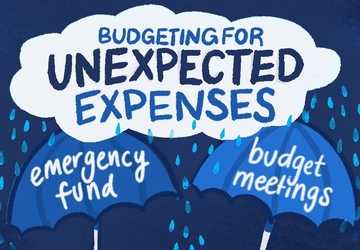How to Prepare for Major Life Events Financially
Various life events are considered momentous occasions, which entail different aspects of finance. These occurrences include marriage, home purchase, childbearing, and retirement planning, which can make or mar your financial status.
Various life events are considered momentous occasions, which entail different aspects of finance. These occurrences include marriage, home purchase, childbearing, and retirement planning, which can make or mar your financial status.
Planning for these critical events is essential to avoid stress and plan for a financially secure future. All these milestones could be achieved without stress, and each could be faced effectively with the proper planning and strategies.
This blog post will review helpful information and professional advice on better planning and saving money for life events. You should take the steps described here to avoid future losses and build a solid base.
Whether you have just begun your finances or are plunging into it, this post will help guide you on exactly what you need to do to meet your financial goals. Keep reading and learn how to manage your finances and celebrate life's most significant milestones.
5 Steps to Financially Prepare for Major Life Events
Budgeting is also an essential primary strategy in preparation for significant life events of financial significance or lifetime goals. Knowing what to expect during influential milestones will help you avoid being caught up by surprise, which means you will be ready to face these milestones effectively.
We will examine crucial financial planning for accomplishing various significant life experiences to help guide you accordingly.
1. Preparing for Marriage

A wedding is a beautiful landmark, but it has its share of responsibilities and commitments, including financial aspects.
To ensure a smooth financial transition into married life, follow these steps:
● You must prepare a wedding budget and ensure that it is not exceeded so that you can enjoy your special day.
● Examine the financial strategies and models with your partner to ensure that you are in harmony.
● One critical part of a healthy financial merger is integrating your assets and charges: learn how to establish and maintain a co-spouse budget.
In doing so, you will avoid the danger of incurring unnecessary expenses, maintain constructive financial relations with your other half, and build the foundation for a happy marriage.
2. Buying a House
Home buying involves a lot of money and is considered one of the most critical investments an individual makes in his lifetime.
Here's what you should do:
● Budget for a down payment to lessen the amount borrowed in the mortgage and, therefore, lower monthly payments.
● Late payments damage the credit score, so you must make better arrangements to pay your mortgage in time to access better deals to complement your mortgage interest rates.
● Lastly, always include the cost of maintenance and repair since they can sometimes be costly in the long run and lead to devastating financial costs.
This means that by adhering to these steps, you will get a good quote on your mortgage, manage your financial pressures in the wake of your purchase from the bank, and establish a smooth process of transitioning into homeownership.
3. Having Children
Beginning a family is indeed a beautiful thing. Still, it also implies several changes for the family and its members, and one of the changes is the rise of new financial responsibilities.
To prepare for the costs associated with having children, consider these steps:
● Set an allowance for each factor in the child's needs, including child care, education, and health care expenses.
● Save as early as possible for the college education of your child or children to allow the money set aside to grow for years.
● The financial cost of healthcare will likely increase as your family grows, so reviewing your health insurance policies is advisable.
In this way, you will be prepared financially for childcare expenses, and you will be preparing your child for his future education.
4. Saving for Retirement
Preparing for retirement is a crucial part of life, as it aims to ensure financial stability after working years.
To prepare financially for retirement, follow these steps:
● Understanding your retirement plans and time frame is essential to any saving or investment plans you intend to undertake.
● Save towards retirement by funding the various retirement savings plans, including 401(k) and IRA, because they are tax benefits and, where applicable, employer matching is offered.
● Invest across asset classes to hedge against the returns of more aggressive investments. A more conservative or less risky investment can offset the less predictable and sometimes lower-performing assets.
Using these approaches, one can be fully prepared for post-work life and avoid becoming a burden to their families or the state.
5. Coping with Unexpected Events

One can never know what life has in store for him. Some moments may be financially demanding.
To prepare for unforeseen circumstances, consider the following steps:
● A contingency fund is created to meet emergency costs, such as job loss or medical emergency.
● Always invest in sufficient health and life or disability insurance to protect yourself and your family.
● Discuss how one would manage a job loss or a medical bill without considerably affecting one's long-term plan.
However, following these guidelines will ensure you are always financially covered in any shock that comes your way or to your loved ones.
Take Control of Your Financial Future Today!
Financial planning for life's crunch moments is economically prudent and inevitable. Finally, saving results in a positive and confident approach to critical life events.
Practical concerns such as budget should be balanced with the romance and delight of such occasions. This is the time to start practicing these financial planning tips and see your dreams come true.
Remember that starting as early as possible gives you a longer time to develop good financial planning strategies. Achieve the financial independence you have always wanted today to avoid being caught off guard tomorrow.
Frequently Asked Questions
Q. How much should I save for an emergency fund?
Ans. The New Year, your money goal should actively involve saving $3000-$6000 in a separate savings account for at least three to six months of living expenses. This will provide some financial security in a cash crunch, such as when one loses their job or has to go to the hospital.
Q. What are the best ways to save for a child's college education?
Ans. Signing up for a 529 college savings plan or a Coverdell (ESA) may be worthwhile. These accounts allow your money to grow tax-free up to the level likely to be used on qualified education expenses.
Q. How can I improve my credit score before buying a house?
Ans. April also became punctual when paying all the bills, maintaining low balances on credit cards, and avoiding opening new credit lines. Check your credit score and review the report for any errors. If there are any, report them and get them corrected.
Q. When should I start saving for retirement?
Ans. Begin contributing to your retirement fund whenever you are ready and if you can from your 20s. Make flexible contributions based on your employer's sponsored plans for retirement, such as 401(k) plans, and supplement them with an Individual Retirement Account plan (IRA).